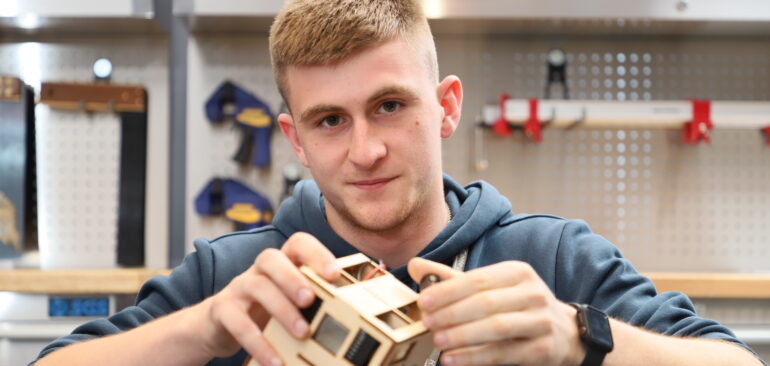T Level Civil Engineering
Our T Level Civil Engineering course offers students vocational skills including construction project management, maths, quantity surveying, structural design and can help students into skilled employment, higher study or apprenticeships. Each T Level includes an in-depth industry placement that lasts at least 45 days. Students get valuable experience in the workplace; employers get early sight of the new talent in their industry. T Level students spend 80% of the course in the classroom, learning the skills that employers need. The other 20% is a meaningful industry placement, where they put these skills into action.
- Course Information
- Course Code
- LT3CIVEN/S
- Attendance Pattern
- Daytime
- Course Level
- Level 3
- Study Mode
- Full Time
- Course Location
- Leyland Campus
- Age Group
- School Leavers (16-18)
- Course Duration
- 2 years
- Overview
T Levels are a fresh and exciting alternative to A Levels as they offer a work focussed experience which combines academic study of the highest quality with practical industry related skills. In addition to this, T Levels include a mandatory 45 day industry placement that has been built into the course to further develop individual skills. If you wish to work in the construction sector with a focus on Civil Engineering, then this T Level is for you. This course is best suited to students who prefer a practical approach to learning yet want a largely classroom-based course, 5 days a week. The T Level is equivalent to 3 A Levels and focuses on vocational skills that can help you obtain skilled employment, university study or an apprenticeship.
Industry Placement Requirement for T Level Students:
As part of the T Level qualification, all students must complete a mandatory industry placement of a minimum of 315 hours (approximately 45 days). This placement is a vital element of the course, allowing students to apply their learning in a real-world setting and develop essential skills for their chosen career. While the college will provide support and guidance, students are ultimately responsible for securing their own placement. This encourages independence and prepares learners for the expectations of the workplace.
Please note: Failure to complete the full placement requirement will mean that students are not eligible to receive the full T Level certificate. Instead, they will be awarded a Statement of Achievement for the elements of the course they have successfully completed.
We strongly encourage students to begin exploring opportunities early and make the most of the support available through the college’s industry placement team.
Course Highlights:
Revit Academy, Industry Placements and outstanding teaching & learning
Below, two of our Engineering students survey the construction site outside Buttermere, which was completed in late 2022.

- Entry Requirements
Entry requirements for this T Level Programme at Runshaw College are a minimum grade 5 in Maths, Science and English, and two other GCSEs at grade 4.
Please note, some courses and subjects will have additional specific entry requirements or require DBS clearance to undertake placements. Information about this can be found in our course leaflet (available to download above), the Apply Portal, and on your offer letter which you will receive after your interview.
- How will I be assessed?
Students will be assessed through observations, written assignments, and employer set project (1st year) and exams and an occupational specialist project (2nd year).
The T Level certificate will include:
• an overall grade for the T Level, shown as pass, merit, distinction or distinction*
• a separate grade for the core component, using A* to E
• a separate grade for the occupational specialism (Civil Engineering), shown as pass, merit or distinction - Progression Pathway
This course is suitable for anyone wanting a career in civil engineering. Students can progress onto roles such as civil engineering technician, CAD technician, consulting civil engineer and design engineering, or progression into university. Students studying engineering based subjects at Runshaw College have progressed onto university to study a wide range of courses, including Engineering, Robotics and Architecture to name a few, or into careers with a variety of companies, including Rolls Royce, BAE Systems and Cadent Gas.
- Teaching & Assessment
Students will be assessed through a continual assessment using practical observations, written assignments, exams and an employer set project. The T Level certificate will include:
• An overall grade for the T Level, shown as pass, merit, distinction or distinction*
• A separate grade for the core component, using A* to E
• A separate grade for the occupational specialism (Civil Engineering), shown as pass, merit or distinction

